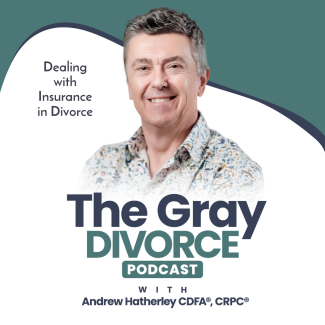
The Gray Divorce Podcast: Episode 75 Dealing with Insurance in Divorce
Andrew explores the role of life insurance in divorce, from protecting alimony to dividing cash value policies fairly.
Types of Life Insurance—What You Need to Know
Andrew provides a simple primer on the main categories:
Term Life Insurance:
- Temporary and inexpensive
- Pure protection without cash value
- Ideal for securing spousal support
Permanent Life Insurance:
- Includes several subtypes:
- Whole Life: Guaranteed death benefit, fixed premiums, and cash accumulation
- Universal Life (UL): Flexible premiums and death benefit, interest-based growth
- Indexed UL: Growth tied to market indexes, with floors and caps
- Variable UL: Higher growth/risk with investments in subaccounts
- Guaranteed UL: Lifelong coverage with little/no cash value—hybrid between term and whole
- Includes several subtypes:
Life Insurance for Spousal Support
Andrew discusses how life insurance is commonly used to secure alimony or spousal support, including:
- Why life insurance is often court-mandated in settlements
- Matching coverage amounts to the total alimony obligation
- Importance of naming the recipient as owner and irrevocable beneficiary
- Using term insurance to match the support duration cost-effectively
- Alternative strategies when life insurance is unaffordable or unavailable
- Getting medical underwriting done before divorce is finalized
Dividing Cash Value Insurance in Divorce
When cash value policies appear on the marital balance sheet, Andrew shares:
- How to determine whether a policy is marital vs. separate property
- Why you should always evaluate the cash surrender value (not the death benefit)
- Common division methods:
- Cancel and split value
- One spouse retains; other gets offset
- Transfer ownership
- Use policy to secure support
- Importance of reviewing beneficiary designations, premium responsibilities, and tax implications
A Warning About Overexposure
Andrew cautions listeners about clients with the majority of their assets in insurance—particularly in cases where:
- Complex products were aggressively sold, not strategically planned
- Professionals like doctors, lawyers, and business owners are over-targeted
- The policyholder lacks financial literacy to evaluate product risks
- 90% of assets in insurance = major red flag
Final Advice
Andrew emphasizes:
- Life insurance can be invaluable in the right situations
- Don’t rely solely on product sellers, vet your advisor
- Look for someone who is:
- Well-informed on estate and divorce planning
- Able to explain benefits and tradeoffs clearly
- Focused on your needs—not commissions
Resources
Website: www.transcendretirement.net
Contact Andrew: Via the website for questions about insurance and divorce

